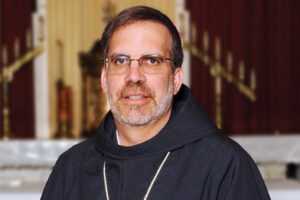God Takes Delight
The Working Catholic: God’s Pleasure
by Bill Droel
Ben Cross died last week. He was an actor best known for his portrayal of Harold Abrahams, an Olympic runner, in Chariots of Fire (Warner Brothers, 1924). Abrahams is a Jewish student at University of Cambridge. He has to deal with anti-Semitism on his way to the 1924 games in Paris. The film, based on a true story, won four Academy Awards including best picture.
The plot around Abrahams has a parallel story line. Ian Charleson, who died in 1990, plays Eric Liddell, another young runner. Liddell is supposed to go to China to engage in Christian missionary activity. His sister, touching a part of his conscience, says that training for the Olympics distracts him from God’s calling. Liddell is torn but makes peace with his plan. In the film’s famous line, he says: “I believe God made me for a purpose. But He also made me fast, and when I run, I feel His pleasure.”
The Lord takes delight in endeavors well done. Once upon a time a prominent church hereabout commissioned an artist to paint the figure of God the Father. The artist was so thrilled by the greatness of her subject that she vowed to do the painting on her knees. Well, this went on for a few days until God appeared to her and thundered: “You are not supposed to paint me on your knees. You are supposed to paint me well.”
The notion persists that for work to be holy it either must occur under church auspice or it must get an additional coating of piety or sacredness.
What is the proper definition of holy work? It is the thing one does to live and/or the thing one lives to do. Volunteering and homemaking can be good work presuming the worker receives sufficient financial resources from elsewhere. If the good work is the way one supports oneself and a family, the pay must be just. Without a family wage, the endeavor is objectively damaged. The paternalism of the employer and the desperation or generous heart of the employee is irrelevant in calculating a family wage.
Good work is how a person fulfills his or her human nature. Each of us has a God-given nature that came with a work impulse already installed. Good work is how a person participates in the on-going creation and redemption of society.
Good work is a primary way that a person exercises the virtue of solidarity by cooperating with fellow workers for improvements in the product, the service, the delivery or even the culture of the industry or sector. This impulse to associate for improvement is another built-in feature of human nature.
All types of jobs qualify as good work, excluding only those that violate God’s plan: a predatory lender, a trafficker of teenage girls, or a gang leader. Good work is any endeavor that upon a worker’s contemplation she or he sees God’s perfection reflected. This does not mean that the medical procedure has to always be a total success. The class on obtuse angles or the one on dangling participles can flop. The anticipated lauds for the play or the concert do not occur. The courtroom defense does not impress the jury. The day or the week or the month of child rearing can be total frustration. At a certain time, however, a worker can look back upon an endeavor and know that given the challenges of the job she or he did their best.
Unfortunately, Christians do not—for whatever reason—get the message that their work matters to God; that work in itself contributes to the spiritual life. Yet all Christians, as St. John Paul II (1920-2005) said, are called to a spirituality of work.
Dorothy Sayers (1893-1957), playwright, essayist and creator of the fictional detective Lord Peter Wimsey, says that Christians will have only a pro forma adherence to the faith as long as they do not hear or feel that Christianity has anything to do with the meaning of work—on the job, around the home and in the community. An intelligent carpenter, she says, hears that religion means “not to be drunk and disorderly in leisure hours and to come to church on Sundays. What the church should be telling him [or her] is this: The very first demand that religion makes…is that he [or she] should make good tables.”
To be clear: God wants catechists and preachers in the mission field and around the parish. God wants those teachers and preachers to be compassionate. But a tender heart and willingness to volunteer are not sufficient. God feels pleasure when preachers, catechists and all workers do it well. For example, God expects preachers and catechists to critically study Scripture. God expects them to stay current, using magazines like Commonweal, America or Christianity Today, just as God expects doctors to read medical journals carefully, engineers to keep up with safety manuals and to read about new materials or chemical compounds.
God made me fast, and when I run, I feel His pleasure, said Olympian Eric Liddell. The Lord takes delight in all endeavors well done.
Droel edits a free newsletter on faith and work, INITIATIVES (PO Box 291102, Chicago, IL 60629)

